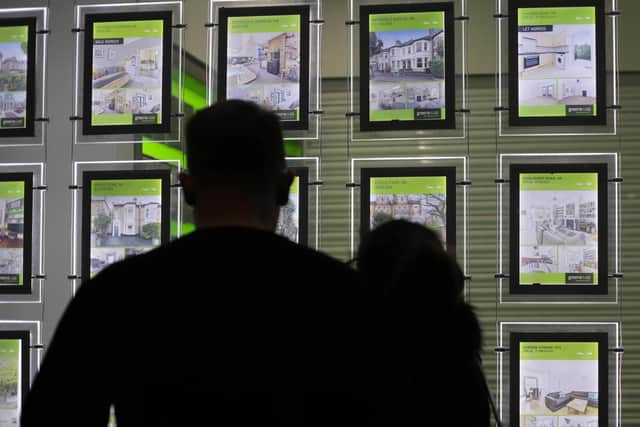New record high for average house price in Scotland as mortgage rates rise
The average house price in Scotland now stands at £204,305, a slight increase from the figure in the Halifax Price Index last month.
Scotland, London, Eastern England and the North East of England have seen annual house price inflation fall to single-digit levels.
Advertisement
Hide AdAdvertisement
Hide AdDespite a series of economic factors and concern about interest rates in the short term, overall average house prices in Scotland are up by just short of £16k over the last year, and by more than £32k since the start of the Covid-19 pandemic in March 2020.


In the UK, property prices edged down in September, from a record high recorded the previous month with house prices falling back slightly by 0.1% in September, according to the figures from Halifax.
The annual rate of house price growth also slowed to 9.9% in September from 11.4% in August – returning to single digits for the first time since January.
A typical UK property now costs £293,835, according to Halifax’s index.
The number of mortgage products available fell sharply following the recent mini-budget and as product choice has gradually returned, lenders have been pricing their mortgage deals upwards.
The average five-year fixed-rate mortgage and the average two-year fix breached 6% this week – the first time this has happened in more than a decade – according to data from Moneyfacts.co.uk.
Kim Kinnaird, director, Halifax Mortgages, said: “The events of the last few weeks have led to greater economic uncertainty, however in reality house prices have been largely flat since June, up by around £250.
“This compares to a rise of more than £10,000 during the previous quarter, suggesting the housing market may have already entered a more sustained period of slower growth.
Advertisement
Hide AdAdvertisement
Hide Ad“Predicting what happens next means making sense of the many variables now at play and the housing market has consistently defied expectations in recent times.
“It’s important to look at slower growth in this context – since the start of the pandemic average property values have risen by around 23% (nearly £55,000) with detached house prices up by more than £100,000 over the same period.”
Mark Harris, chief executive of mortgage broker SPF Private Clients, said: “While the turmoil of the past couple of weeks will go down in the history books, the money markets seem to have settled a little.
“It is important to reiterate that the mortgage market is still open for business.”
Alice Haine, a personal finance analyst at Bestinvest, said: “While the pace of mortgage rate rises has accelerated since the mini-budget, the situation is not a complete surprise.
“Mortgage costs have been increasing steadily since December when the Bank of England first started pushing up its base rate from a record low of 0.1% in a bid to curb runaway inflation.
“The base rate now sits at 2.25%, with expectations it might jump up to 1% at the Monetary Policy Committee meeting next month, pushing up mortgage rates once again.”
Iain McKenzie, chief executive of the Guild of Property Professionals, said: “Estate agents are still seeing stock shortages in many areas of the country, something which has supported elevated house prices throughout the boom.”
